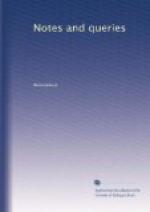Referring to the Sentences of Publius Syrus, published, with the additional Fables of Phaedrus, from the Vatican MSS., by Angelo Mai, I found the line thus given:
“Inopi beneficium bis dat, qui dat celeriter.”
The same idea, I believe, occurs in Ovid. Query whether it is not a thought naturally presenting itself to the mind, reflected by memory, confirmed by experience, and which some Mimic author has made proverbial by his terse, gnomic form of expression.
S.H.
* * * * *
Parallel passages.
I take the liberty of sending you several parallel passages, which may probably appear to you worthy of insertion in your valuable paper.
1.
“There is a tide in the affairs
of men,
Which, taken at the flood, leads on to
fortune.”
Shakspeare: Julius Caesar.
“There is an hour in each man’s
life appointed
To make his happiness, if then he seize
it.”
Beaumont and Fletcher: The Custom of the Country.
“There is a nick in Fortune’s
restless wheel
For each man’s good—”
Chapman: Bussy d’Ambois.
2.
“The fann’d
snow,
That’s bolted by the northern blast thrice
o’er.”
Shakspeare: A Winter’s Tale.
“Snow in the fall,
Purely refined by the bleak northern blast.”
Davenport: The City Nightcap.
3.
“Like pearl
Dropt from the opening eyelids of the morn
Upon the bashful rose.”
Middleton: The Game at Chess.
“Together both, ere the high
lawns appeared
Under the opening eyelids of the morn,
We drive afield.”
Milton: Lysidas.
4.
“Brief as the lightning in the collied
night,
That in a spleen enfolds both heaven and
earth,
And ere a man hath power to say—Behold!
The jaws of darkness do devour it up.”
Shakspeare: Midsummer Night’s Dream.
“Nicht Blitzen gleich, die schnell
vorueber schiessen,
Und ploetzlich von der Nacht verschlungen
sind,
Mein Glueck wird seyn.”
Schiller: Die Braut von Messina.
G.
Greenock.
* * * * *{331}
ERRORS CORRECTED.
I.—Sharon Turner’s Hist. of England (Lond. 1814. 4to.), i. 332.
“The Emperor (Henry VI.) determined to extort an immoderate ransom; but, to secure it, had him (Richard Coeur de Lion) conveyed to a castle in the Tyrol, from which escape was hopeless.”—Note “104. In Tiruali. Oxened. MS.”
Ibid. p. 333:
“He (Richard) was removed
from the dungeon in the Tyrol
to the emperor’s residence
at Haguenau.”—Note “109.
See
Richard’s Letter
to his Mother. Hoveden, 726.”




